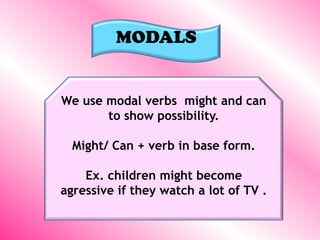Recommended
More Related Content
What's hot
What's hot (19)
Business English - Powerful Telephone Talk - Ash Vyas

Business English - Powerful Telephone Talk - Ash Vyas
Similar to Ingles
Similar to Ingles (20)
Job-Interview a subject for communication for various purposes

Job-Interview a subject for communication for various purposes
Career Coach Guide To Job Interview and Salary Negotiation 2015

Career Coach Guide To Job Interview and Salary Negotiation 2015
C2 Proficiency - Key Word Transformation Made Easy

C2 Proficiency - Key Word Transformation Made Easy
Ingles
- 1. MODALS We use modal verbsmightandcan to show possibility. Might/ Can + verb in base form. Ex. childrenmightbecomeagressiveiftheywatch a lotof TV .
- 2. EXPRESSING ADVICE AND OBLIGATION Should : It Express advice Aff. He shouldloseweight. Int. Whatshoukd He do ? Neg. youshould´nteatcandy. Must : It expresses strongobligation . It dependsonthepersonspeaking . Aff. Shemustseethedoctor. Int. whatmust I do ? Neg. youmustn´t play videogames. Have to : It expresses strongobligationdependingonanotherpersonorsomethingthe speaker can´t control. Aff. Theyhave to fill in a form. Neg. youdon´t have to come. Int. What do I have to do ?
- 3. MODALS VERBS WOULD AND WILL FOR REQUESTS. Wouldand Will are usuallyconsidered more politethan more directquestions (e.g. whatwouldyoulike to eat? Is considered more politethanwhat do youwant to eat Whatwouldyoulike to eat ? I´d like a hamburger./ I´llhave a small salad Use can +verb in the base form to show abilitiesandposibilities use may (not) +verb in the base form to show posibilities
- 6. Kinds of sentences Declarative: a declarativesentencemakes a statement. Interrogative: aninterrogativesentenceask a question. Exclamatory: anexclamatorysentence shows stron feeling. Imperative: animperativesentencesgives a command. Tom goes to school. Did Tom go to school? Themonster is attacking ! Hurry Tom! Go to schoolnow.
- 8. QUESTIONS
